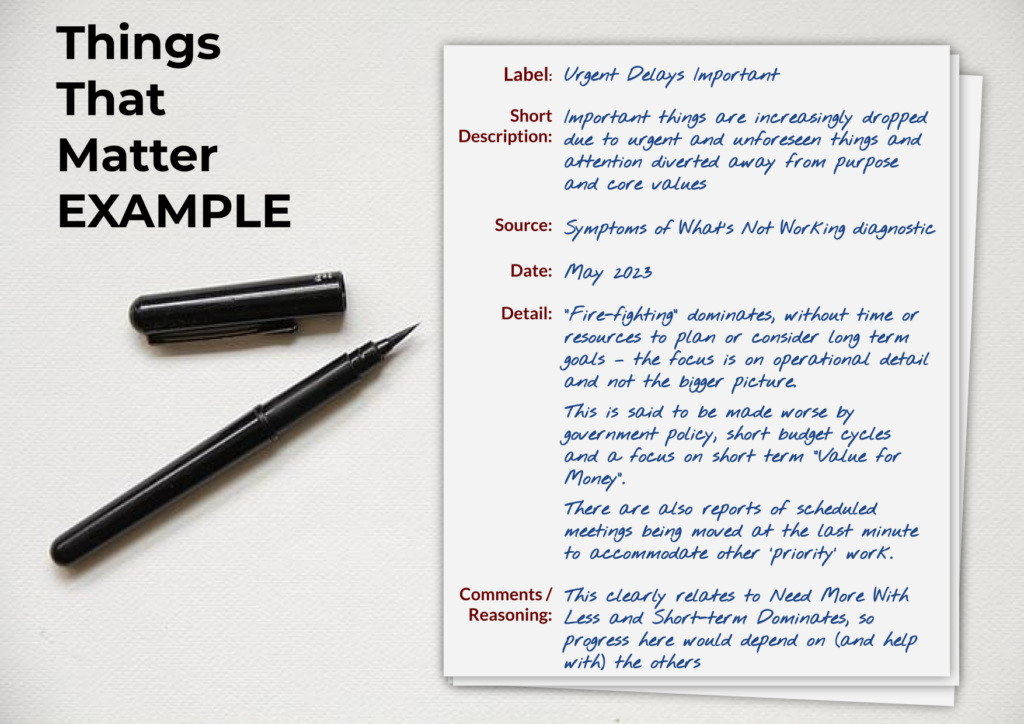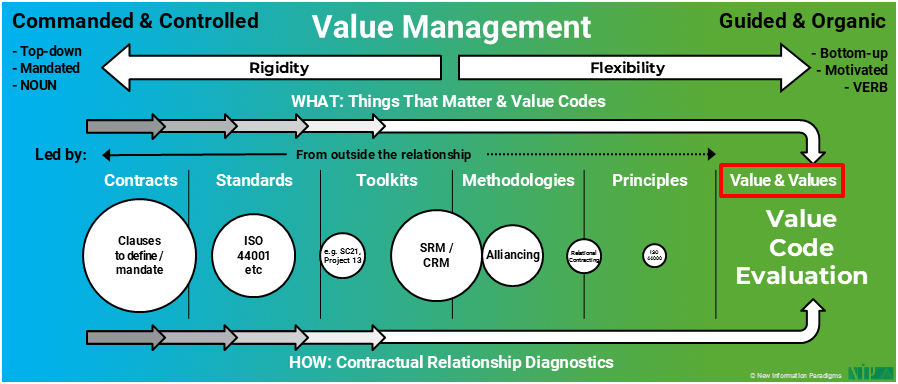Value Management: Things That Matter
Establishing, focusing-on and delivering-on the Things That Matter is at the core of Value Management.
Does that sound simple? It’s not.
Surely it’s what everyone is already doing? It’s not.
To understand why, we need to look at:
- What we mean by “Things That Matter”
- Why they are so pivotal and challenging
- Why people aren’t focused on them as they need to be
What are “Things That Matter”?
The Things That Matter are anything and everything that constitute Value: Value firstly to end customers, and then – from there – Value to your organisation, your employees, your stakeholders and your partners.
The Things That Matter are therefore the currency of Value. They include goals, targets, values, risks, issues, concerns and far more besides:
- Some will be towards-the-positive (e.g. “achieving competitive advantage over x“), whilst some will be away-from-the-negative (e.g. “we need to resolve this dispute to make progress“).
- Some will be also be neutral or driven by external factors (e.g. “this market requires us to be ISO-accredited“).
- Some will be long-term and fundamental (e.g. “not using single-use plastics“); some will be time-dependent and situation-specific (e.g. “appoint new CFO by Christmas“).
What the specific Things That Matter are will vary greatly with context, and especially Ecosystem positioning and Lifecycle stage – e.g. in a negotiation or planning stage, values and goals are more likely in focus; later, it is likely issues that will come to dominate.
However, at every stage, whilst some Things That Matter will be objective and concrete, many – usually most – will be subjective and intangible.
Why Things That Matter Are So Pivotal and Challenging
The first clue is in the name – these things matter.
The Things That Matter are what define and motivate organisations, their projects and their relationships; they are what your customers, stakeholders, employees and partners will ultimately judge you on.
The Things That Matter are pivotal (and you can read more about all the reasons why).
It is therefore imperative that the Things That Matter are established, focused-on and delivered-on, but that’s where it gets challenging. Why?
Because the most critical Things That Matter are typically subjective, which means they don’t feature in contracts (at least not effectively) and even less so in how projects and relationships are managed and measured.
Such Things That Matter will usually be broad, vague or both – emotionally important, but hard to know what to do with – and it often won’t be clear what action could be taken to address them, at least directly.
Further compounding the challenge is that People also naturally gravitate to the objective, the quantifiable and the easily-measurable – these things give us a (largely false) sense of control and order, attracting disproportionate focus and attention.
However, as Jeff Bezos has said, even anecdotal evidence makes clear that the right things aren’t being measured:
“When the data and the anecdotes disagree, the anecdotes are usually right. It’s usually not that the data is being miscollected, it’s usually that you’re not measuring the right thing.”
Things That Matter Therefore Aren’t In Focus
Most would assume that the Things That Matter are what their organisation, its employees, its stakeholders and its partners are all focused on – everyone just “knows” and agrees what things matter and what to do about them.
However, we now see that isn’t the case: most of the key, subjective Things That Matter fall outside conventional approaches, and even if an attempt is made to articulate them, it’s usually top down and vague, e.g. in corporate values, mission statements, behavioural charters, etc.
Even if such vehicles contain the “right” Things That Matter (unlikely), they are largely disregarded in practice because they:
- Are “imposed” and bolted-on; not collectively-owned and baked-in.
- Typically just assert a priority or describe something that will happen, but without saying why or how: a source of frustration rather than inspiration.
- Get lost in the ‘noise’ of other communication.
- Remain static or lag behind change.

If you then ask at the front line what the Things That Matter are to their organisations – and, in relationships, the ones shared by both organisations – you’ll usually either get no answers, unclear answers, varied answers or even contradictory answers.
Meanwhile, from a management perspective, there is a sense that the Things That Matter at the front line are obscured or even invisible – ‘locked’ in the minds of front-line staff closer to the end customer.
And so the most crucial Things That Matter are not properly surfaced, not effectively expressed, not collectively owned, not aligned (or the differences managed), not effectively measured, and often all of these: ultimately, they are not working.
To date, there hasn’t been an alternative approach that can successfully address all this, but now there is: Value Management.

How to get started:
Featured content:

Things That Matter
Articles related to Things That Matter:
The Transformation Needed for CCM: Part 3
Value Management meets the challenges of demystifying subjective value, and making it measurable and manageable – a complete value framework that can only be delivered with online diagnostics….
Why Tesla are Penguins in Santa Hats
A Christmas card I saw got me thinking about the importance of polarity and poles, and the tension and turbulence between them. Value Management resolves the tension. And it explains why Tesla are penguins in Santa hats……
Negotiating Value in Contractual Relationships: Part 1
Value is why we do anything: it’s the goal of our relationships, it’s what our contracts should support, and it’s what the negotiations for those contracts should focus on. But “value” is a much-misunderstood term……
Value Management: How to Avoid Being Overwhelmed
If they don’t realize it already, they will soon: anyone engaged in relationships is becoming overwhelmed by the difficulties and Complexity of decisions and trade-offs. Experience-based intuition currently bridges the gap, but it can’t scale and is doomed to fail. Here, we see the ideal…
The Case for Value Management: Part 3: Making it Happen
Pretty much every organization claims that value is a big deal to them. In this final part, we’ll look at the transformation involved with Value Management and how to make it happen – the people involved, the initial process and then how to spread and…
The Case for Value Management: Part 2: the Extraordinary Opportunity
Pretty much every organization claims that value is a big deal to them. In the second part, we’ll look at the huge opportunity there is for individuals and teams to take responsibility for – and ownership of – Value in their organizations, and see why…
The Case for Value Management: Part 1: the Extraordinary Need
Pretty much every organization claims that value is a big deal to them. But when you look at what that means in practice, the extraordinary need for a dedicated cross-functional Value Management function becomes clear, because almost all organizational challenges can’t be met without one….
Empathy: the Missing Piece of the Collaboration Puzzle
Commercial relationships are struggling, and nowhere is this more true than in collaborative relationships. Such relationships are where Complexity – from both inside and outside the relationship – is highest, and where the fatal flaws in how we typically operate are most clearly (and devastatingly)…








